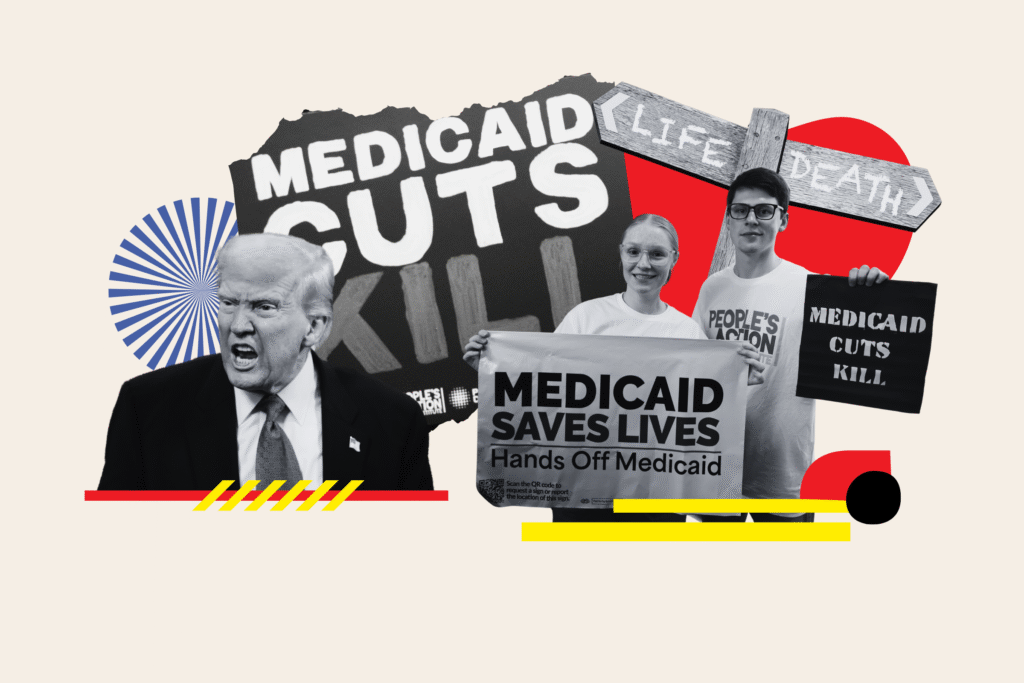A new study by researchers at Harvard Medical School and City University of New York Hunter College predicts that the Republican-backed “big beautiful bill,” now under debate in the Senate, could increase the number of annual deaths in the U.S. by more than 16,500 and leave 7.6 million more Americans without health insurance.
Why It Matters
President Donald Trump’s massive U.S. budget proposal has drawn sharp criticism from some lawmakers and health experts over its proposed Medicaid cuts. The Congressional Budget Office (CBO) estimates the bill would slash the program by about $790 billion over the next decade to help offset roughly $4.5 trillion in tax breaks. Medicaid provides health coverage to tens of millions of low-income Americans, with around 71 million currently enrolled in the program.
The CBO estimates that more than 10 million Americans could lose their health coverage if the bill becomes law. Critics warn the move could lead to worse health outcomes nationwide and, over time, drive up medical costs. Supporters of the bill remain firm in their belief that the cuts are necessary to reduce the federal deficit.
Medicaid has expanded over time, most notably under former President Barack Obama through the Affordable Care Act, which broadened eligibility for low-income adults. While states contribute to Medicaid funding, the majority comes from the federal government—meaning proposed federal cuts would have a disproportionately large impact on the program.
What To Know
Researchers Dr. Adam Gaffney of Harvard Medical School and Dr. Steffie Woolhandler of City University of New York Hunter College published a study in the Annals of Internal Medicine, finding that the cuts would have profound nationwide impacts. The report estimated around 1.9 million people to lose access to a physician, 380,000 women to miss recommended mammograms and 7.6 million more uninsured Americans.
“When patients lose health coverage, they go without all types of care — visits to the doctor, prescription drugs, routine tests, and procedures. In fact, they may even avoid the emergency room when faced with serious issues, given fears of medical bills. Such delays can be deadly,” Gaffney told Newsweek in an email statement.
Woolhandler, a primary care physician, told Newsweek in a phone call that visits to a health care provider are essential for early detection, as doctors can examine patients for mild conditions such as high blood pressure, blood sugar and cholesterol, “that we can treat to prevent complications.” She added that doctors may also identify bumps, rashes or bowel changes that could be signs of serious conditions, including cancer or tumors.
“The simple reality is that modern medical care saves lives,” Gaffney also said.
Health care like routine checkups, medication and access to preventive care such as mammograms are essential. Screening has nearly doubled early-stage breast cancer detection, according to a study published in The New England Journal of Medicine.
Drug prices are also likely to increase for Americans who get dropped from Medicaid, which may have deadly consequences.
The effects of the cuts will be nationwide, although there’s potential that certain states may increase their contribution to keep more people in the program.
“It’s a deep red state, but they have a very large share of their population on Medicaid, and Louisiana is going to be very, very hard hit,” Woolhandler said, adding, “the recipients themselves are going to lose their Medicaid, the hospitals and clinics there are going to lose a huge part of their funding.”
Rural hospitals often rely on Medicaid, with the American Hospital Association’s analysis suggesting that the Republicans’ “big beautiful bill” would result in a $50 billion reduction in federal Medicaid spending on those medical centers over 10 years.
“ If you take away people’s medical care, their health suffers and they die younger,” Woolhandler said.
What People Are Saying
John Connolly, Medicaid director and deputy commissioner at the Minnesota Department of Human Services, said in a media briefing last week, as shared with Newsweek by the agency: “[The bill] achieves its purported reductions by slashing federal Medicaid funding. But those reductions are actually a cost shift – to states, counties, Tribes, providers and people themselves who will have to pick up the expense of health care no longer covered and the cost of increased administrative burdens.”
Republican Representative Tony Gonzales said last month: “After four years of disastrous national security and economic policies, we’re putting America back on the right track. This morning, I voted yes on the House reconciliation package, which includes funding to reimburse our state for Operation Lone Star costs, a priority I’ve fought for since House budget talks began.”
What Happens Next
The “big beautiful bill” is under debate in the Senate. If passed, it advances to Trump, who has said he would sign the bill into law.
Read the full article here
